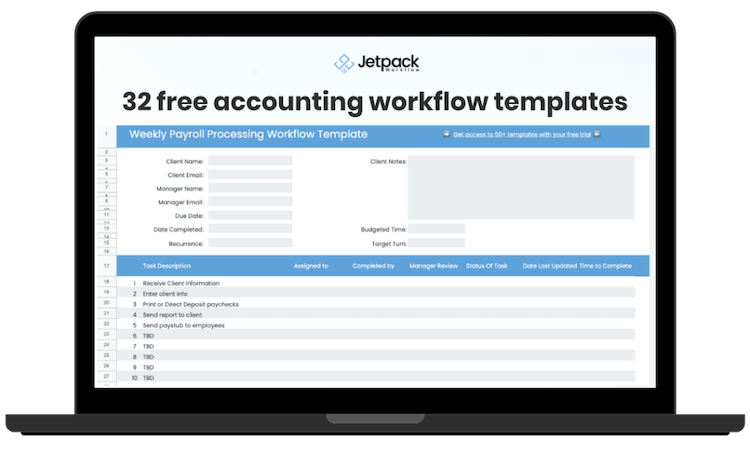

You should have a tax return letter for every tax engagement, signaling an understanding with your clients for the upcoming tax season.
This letter should outline who is responsible for the completeness and accuracy of the tax return, along with your deadlines for receiving documentation for timely filing.
If you don’t have an engagement letter or aren’t sure how to create one, read on. We’ve provided an example of a tax return letter and an explanation of the key subjects it should cover.
A tax return letter is sent to your clients each year before the tax season starts. It outlines the responsibilities you and your clients have and establishes important deadlines. You want to send this letter to your clients in early January so everyone is on the same page and prepared to meet the April filing deadline.
A tax return letter is also a reminder that you’re ready to help your clients with their tax returns; it serves as a form of marketing. Make sure your letter is personable while also covering all the necessary business aspects.
Many firms have switched to emailing clients a tax return engagement letter each year. This method works well if your firm accepts e-signatures and your clients can sign the documents online.
There are a few important reasons to send your clients a tax return letter each year.
For many people, tax season is a time of stress and anxiety, but it doesn’t have to be that way. You can help tax season go smoothly for your clients with planning and preparation.
One of the best ways to prepare for tax season is to remind your clients that it’s coming up. A tax return letter is a great way to do this.
By sending out a tax return letter, you remind your clients of crucial deadlines and help them get organized for tax season. Plus, it shows you’re on top of things and ready to make the task easier for them.
Your engagement letter clarifies for your clients what their responsibilities are in the preparation of their tax returns. Many people assume once they hire a tax preparer, all responsibility lies with the preparer.
Your clients should understand they bear the ultimate responsibility for the information contained in their return. They are also responsible for maintaining backup documentation for the numbers on the return.
You and your firm are responsible for exercising the necessary due diligence and professional judgment in preparing the return. You also need to state that tax preparers are not required to audit information provided by clients.
By clearly outlining the responsibilities of you and your clients, you protect yourself from claims against your firm. You can’t avoid all misunderstandings, but a signed tax letter minimizes the chance you will be liable for any adverse outcomes because of a tax return you prepared.
No one likes receiving an unexpected bill. When you’re dealing with hundreds of clients during the busiest time of year, the last thing you want to spend time on is billing questions.
A tax return letter should outline your fee structure and whether you charge a fixed fee or have an hourly billing rate. The letter should also state how and when you will bill for the return and include payment options.

There are several key items to include in your tax return letter.
Your letter should clearly outline the due date for filing the tax return. Be sure you accurately update this deadline each year. If there are different due dates for state or local returns, these should also be in your letter.
Along with the official filing deadlines, you should also set time frames for receiving documentation from your clients, such as 15 or 30 days before the filing deadline. Explain how you’ll handle the return if you don’t receive the paperwork on time.
In addition to deadlines, you should also explain your standard processing time. If you usually take 2–3 weeks to complete a return, outlining this expectation for your clients saves you time answering requests for updates.
If your engagement only includes tax return preparation, you must state that in your letter. If you offer additional services, such as bookkeeping or tax projection services, you should communicate whether those services are part of the engagement. If extra fees are involved in those services, you should state how you will bill for them.
Your letter should include an explanation of who is responsible for the accuracy of the return. Ultimately, accuracy is the responsibility of your client. Their signature on the return or electronic filing authorization is their acceptance of that responsibility.
The completeness of a tax return relies on your clients submitting all the necessary documentation and is another item to include in your letter. While you can expect reasonable inquiries about this matter based on prior returns or other factors, the client must provide all paperwork necessary to prepare the return.
Include a summary of how you will bill for the return. Because of the considerable variations in the complexity of various returns, a statement about using “standard billing practices” is generally part of the letter. Explain who the client should reach out to if they need a more specific billing estimate.
Close the letter with a signature block to confirm your client has read and accepted the terms of the engagement.
The letter template below is for illustrative purposes only. A signed agreement is binding with your clients and, as such, should be reviewed by a legal professional.
We hope you have had a great year and look forward to working with you again. In order to outline our services and responsibilities, we request that you review and sign the tax service engagement letter below.
To prepare your tax return before the filing deadline, we need to receive your tax documentation 30 days prior to the filing deadline. If we do not receive your documentation by this date, we will file an extension on your behalf, and your return will be filed after the tax filing deadline.
Note that an extension of your tax return only extends the time to file your return. Any taxes due must still be paid by the deadline.
While we scan copies of the documentation you submit to us, it is your responsibility to provide any documentation requested by the IRS in the event of an audit.
In preparing your tax return, we will use our professional judgment to make recommendations. If the IRS questions an entry we created based on our professional judgment, we will argue for the appropriateness of the entry. However, you are ultimately responsible for the information on your tax return. You should carefully review your return before signing it.
If you require additional services such as bookkeeping or tax planning, those are outside the scope of this tax preparation agreement. As such, any additional services will incur fees based on our regular billing rates.
Fees for our tax preparation services will be billed at our standard rates. An invoice will be included with your completed return. If you would like an estimate of the price for your return, please contact us before submitting your documentation. Note that some returns require additional time due to unforeseen complexities, and you will be billed accordingly.
Any unpaid invoices will incur a 1% monthly fee starting 45 days after the invoice is issued.
We will maintain the privacy of all your tax documentation unless required to disclose information by law. Outside of legal obligations, no information will be disclosed to a third party without your written consent.
We look forward to working with you again this year.
I agree to the terms outlined above.
Tired of spending endless hours manually creating and building workflow and process templates for your firm? Simplify your workload with our collection of 32 customizable accounting workflow templates and checklists. This free resource includes a ton of the most popular accounting templates including monthly bookkeeping, weekly accounting analysis, client onboarding procedures, and common tax return forms.

Share this article
Subscribe to the Growing Your Firm weekly newsletter, and get the best accounting workflow templates today!

If you’re part of the 80% of global accounting firms planning to add or expand their advisory services soon, you.

Accounting can be a rewarding career. And especially if you go out on your own and start a firm. Yet.

If you are reading this, then you might be an accountant (or maybe a bookkeeper) looking to start your own.
Get under the hood of Jetpack Workflow’s accounting workflow and project management platform. See some of the top features and how it helps your firm standardize, automate, and track client work more efficiently.

Lessons learned on how top firms grow fast, build stronger teams, and increase profit while working less.
© 2024, Jetpack Workflow.
Ready to find out if workflow software is the right fit for your firm? Select the potential number of users at your company below to get started with your 14-day free trial.
No credit card required to get started.

“Now I have a birds eye view of what’s going on in my firm, so I know what my team is doing, and what’s the status and updates for our clients.”